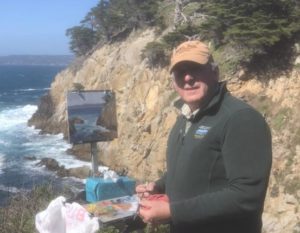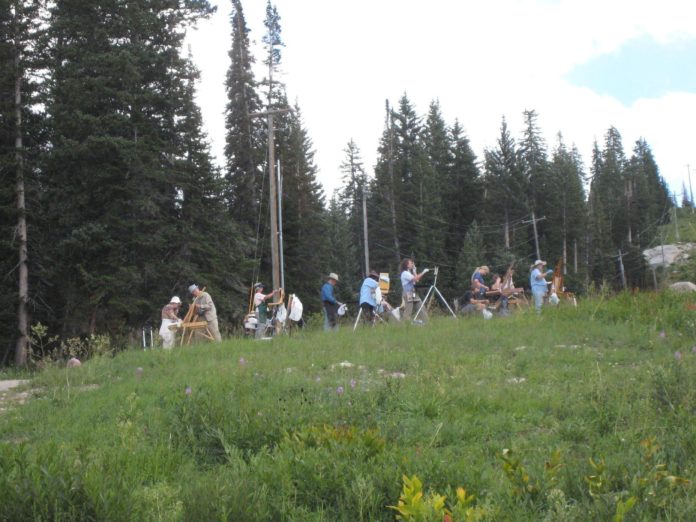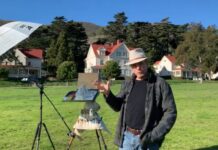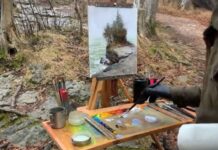Take advantage of the art workshops you attend — don’t wind up returning home, only to paint the same way you always have in the past. In this guest blog post, John Hughes shares tips for your next workshop.
Taking art workshops is one of the best ways for landscape students to gain new knowledge in order to hone their painting skills. There is really nothing like a week or two of intensive study with an artist whose work you admire and want to learn from. Certainly other methods have their merits, such as reading art books and watching videos, along with the myriad of modern cyber learning platforms available today; but actually going to the source and interacting face to face is a special experience that is hard to beat.
Quite frankly, learning to paint well is the result of years of dedicated study, time commitment, and monetary expense; you don’t want to waste these precious efforts and resources! Anyone not willing, or able, to put in the required work will most likely fall short of their intended goal of progressing. But mere attendance at these events is not always enough, without a real plan of attack. Often students take advantage of these special opportunities and wind up returning home, only to paint the same way they always have in the past!
Why is this? The answer is that they don’t incorporate what they have learned in the workshop into their daily practice, and this is unfortunate! It could be that they just don’t have a method for learning that works on a practical level.
For this reason I have put together this list of best practices for workshop participants to consider, in order to get the most out of their experience:
1. Don’t just attend a workshop, go with a determined effort to learn as much as possible during the time you have with your instructor.
2. Write up a list of skills and knowledge that you are deficient in, and make an honest effort to improve your understanding during the workshop.
3. Be prepared to learn. Keep in mind that it is the instructor’s responsibility to come prepared to teach, but it is your responsibility to come prepared to learn.
4. Take notes and refer back to them over the next several weeks, months, or even years. After the workshop is over and you are back home, review your notes, and if they are handwritten, type them over for review while they are still fresh in your mind.
5. Try to use what you learn while you are in the workshop. If the gains that you make academically don’t translate into practice, chances are you will lose that knowledge!
6. Later on after you leave the workshop, incorporate what you want to use and leave the rest. You may not want to use everything your instructor taught you, due to your own artistic tastes, but at least you will have experienced it.
7. Go easy on yourself. Learning new ways often places students outside of their comfort zone, especially during workshops, but that is okay and actually desirable. Remember the old saying: “No gain without pain.” It is often very true!

8. Try to see the big picture and how this particular instructor’s teaching style fits into general painting knowledge. Always look for the universal principles that are being taught. Different teachers have different ways of doing things, but trust me, there is a common thread that runs throughout all of these methods at art workshops; don’t be thrown by an instructor’s unique personality or teaching style!
The three common threads that are embedded in most approaches to painting are the following, but you may need to read between the lines in order to recognize them:
- Understanding how light works (This can be learned relatively quickly.)
- Studying design principles (This is a lifetime pursuit!)
- Knowledge of your tools (Drawing, color, value, edges, and brushwork.)
9. Don’t spin your wheels during painting sessions at art workshops by being disorganized. It’s very difficult for any instructor to help you if you lack organization at your painting station. Arrange your paints and all of your tools so that you are doing the least amount of reaching and bending during your painting time. Also, have enough of what you need to work, and have it accessible. I can’t count the number of times that I come up to a student’s easel and try to find a brush, or paper towel, or trash bag, or you name it, and they are nowhere to be found. Seriously, I believe in miracles, but not when it comes to painting … If you find yourself becoming frustrated while you are working, it just may be that you are disorganized! Before attending a workshop, set up your gear and make sure it meets these requirements for success.
10. Keep your mixing area clean and have enough paint out on the palette. An instructor can’t help you with your painting when you don’t have the basic colors out. (Red, yellow, blue, and white at a minimum!)
11. Use the right tools for the right job (e.g., bristle brushes for oils and synthetic brushes for acrylics, generally speaking). Also, once a brush has outlived its usefulness, throw it away and replace it with something that actually has the ability to spread paint☺
12. Dress for success when outdoors. Plan for the weather and other conditions; shade your eyes from the sun with a good hat that has a brim; and don’t keel over from lack of water or food. Take care of yourself; you’ll also paint better as a result!
13. Be open to new ideas at art workshops and don’t put too much pressure on yourself either. This whole workshop experience should be fun and relaxing, along with being productive. And remember, progress often comes in small increments; be happy with the strides that you make, no matter how large or small!
I hope that these ideas help you on your next workshop adventure and that you are able to come away with a new appreciation for learning and what you have gained!
Until next time,
John
Upcoming travel and art events with Streamline Publishing:
> Click here to subscribe to the free newsletter, Plein Air Today
> And click here to subscribe to PleinAir Magazine so you never miss an issue!




